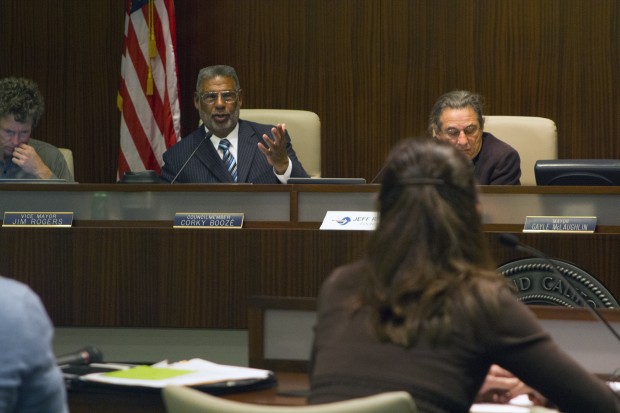
Marin Clean Energy program to launch in Richmond

Councilmember Booze speaks with Dawn Weisz, Executive Officer of Marin Clean Energy, at last night's council meeting. (Photo by: Stephen Hobbs)
By Sara BernardPosted 1 hour ago
This past June, Richmond’s City Council voted to join the Marin Energy Authority, a nonprofit energy provider that derives its electricity from a minimum of 50 percent renewable sources.
This means that in July 2013, all Richmond residents will be automatically enrolled in the Marin Clean Energy Community Choice Aggregation program’s Light Green package. Although power will still run through existing PG&E lines, half of it will come from solar, wind, hydro, and biogas (natural gas extracted from sewage systems or landfills rather than fossil fuels).
Residents can opt out of the program immediately after April 2013, when explanatory letters and postcards will begin arriving in their mailboxes, or they can choose to opt out before they’ve been enrolled two months without any changes to their current plan. If they opt out after two months and return to PG&E, there’s a one-time exit fee of $5 for residences and $25 for commercial buildings.
For Richmond residents who don’t opt out, not much will change, said Jamie Tuckey, Marin Clean Energy’s communications director.
“It’s not going to change the way they pay their bills and it’s not going to change the way their lights work,” she said. “It’s an important change because the energy is cleaner and greener,” but customers will still get a bill from PG&E each month, and won’t see many changes to those bills, except for a line labeled “Marin Clean Energy electric charges” that replaces PG&E’s charges for the generation of power and for an ongoing $4-5 exit fee imposed by PG&E.
So far, in Marin County, even with that fee, MCE’s rates have been comparable to PG&E’s. “We want to be competitive with PG&E’s rates,” Tuckey said.
Those who are enrolled in low-income discount programs like CARE through PG&E also won’t lose any of those discounts.
The biggest source of tension for City Councilmembers Corky Booze and Nat Bates at the meeting Tuesday night was the fact that residents will be automatically enrolled in the program. They stressed the importance of educating the community about their ability to opt out at any time.
“I could support this if in fact the citizens knew they had the right to opt out,” Booze said.
Bates wondered why it wasn’t the other way around. “Why not opt in as opposed to opt out?”
The reason, said Marin Clean Energy’s executive officer Dawn Weisz, is that the Community Choice Aggregation program is based on a California law passed in 2002 that allows nonprofits or local governments to procure electricity and sell it competitively.
“The state wanted to set it up that way so a nonprofit program would have a better chance of success when there’s a monopoly in place,” Weisz said. As a nonprofit organization with no shareholders and 13 employees whose salaries are public information, she said, “Any revenue that’s not used for daily expenses goes back into lowering our rates.”
MCE’s rates are set once a year by a public board with elected officials. Councilmember Tom Butt is Richmond’s current representative on that board. The rates go into effect on April 1 of each year and any rate changes have to go through a 60-day public review process between January and March.
“We think it’s great that customers have a choice,” Weisz said. “Before we were around, there wasn’t any choice. There was only one provider.”
Councilmember Jovanka Beckles agreed. “What I want people to understand is that monopolies are not good to any community,” she said. “Our planet is in trouble. I’m excited to be able to pay a little bit more if that means saving the planet for my relatives and their little ones and generations to come.”
Customers can also opt in – as soon as today – to the Deep Green package through MCE, which means that 100 percent of electricity will be derived from renewable sources. That could raise rates slightly, as Deep Green costs consumers a penny more per kilowatt hour.
After a thorough question and answer period, Councilmembers Bates and Booze seemed to approach the MCE program more favorably, but emphasized the need for ongoing communication with Richmond residents.
“Be clear and upfront and explain to the general public exactly what you’re doing so there won’t be any confusion,” Bates said. “We can’t just arbitrarily throw it on the citizens and say, ‘Take it or leave it.’ You have to educate them.”
Dawn Weisz assured the City Council that she’d like to provide Richmond consumers with as much information about the program as possible, and that MCE has already been working hard to get the word out.
“We’d love to meet with Councilmembers individually and get any suggestions you have on where we can spread the word about the program,” she said.
Beckles suggested that MCE staff visit Richmond neighborhood council meetings and Booze asked if they could schedule a town hall meeting on the topic.
“It’s very valuable for you to explain all of this so that our city can buy into it,” Bates said.
|

